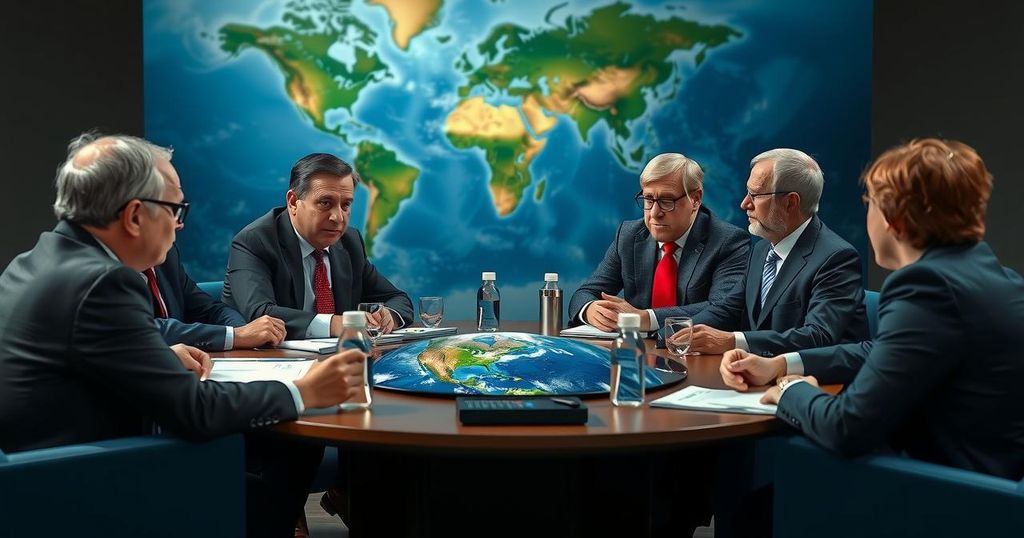G20 leaders are meeting to discuss sustainable development and climate finance, with an emphasis on increasing funding for climate initiatives. The urgency is heightened by global warming concerns and political shifts in the U.S. The G20 is vital in shaping climate responses, with significant commitments being discussed for both climate finance and plastic pollution reduction.
On Tuesday, leaders from the Group of 20 (G20) convene to deliberate on critical issues surrounding sustainable development and the transition to cleaner energy. Their dialogue comes as they aim to bolster the prospects for a successful agreement at the upcoming COP29 climate talks, which are set to take place in Azerbaijan. The host of COP29 has emphasized the importance of G20 nations conveying a strong commitment to combating climate change and providing definitive mandates essential for revitalizing negotiations, which have encountered significant challenges. With 2023 projected to be the hottest year recorded, the urgency of addressing climate change is heightened, especially in light of the impending return of Donald Trump to the U.S. presidency in January, who is expected to withdraw from the Paris Agreement and reverse established climate policies. In a joint statement issued late Monday, G20 leaders highlighted the necessity for a substantial increase in climate financing, calling for a rapid escalatory transition from billions to trillions in funding sourced from diverse channels to effectively combat climate change. The leaders collectively recognized the crucial need for COP29 negotiators to establish a definitive financial goal, delineating the support that wealthy nations must provide to less affluent developing countries in their climate initiatives. While the G20 statement underscored the urgency of this issue, it refrained from specifying potential resolutions to be discussed at the U.N. summit, which is set to conclude on Friday. Economic experts suggest that achieving a target of at least $1 trillion annually is vital, yet developed countries, particularly in Europe, advocate for expanding the contributor base to include wealthier developing nations, such as China and affluent Middle Eastern countries, to ensure an ambitious financial goal. Conversely, developing nations, including Brazil, the G20 host, have resisted this proposal, arguing that the primary responsibility for climate change rests with historically developed nations. In recent discussions, it was suggested that developing countries might offer contributions on a voluntary basis, although such language did not find its way into the final agreement. As G20 nations commenced their annual summit in Rio de Janeiro on Monday, President Luiz Inacio Lula da Silva remarked on the pervasive evidence of climate change’s impacts worldwide, underscoring the urgent need for action. Given that G20 nations account for 85% of the global economy and are responsible for over three-quarters of emissions contributing to climate change, their agreement is pivotal in shaping global responses. Moreover, the G20 has committed to establishing a binding treaty aimed at curbing plastic pollution by the end of 2024, with discussions anticipated to resume shortly, following over two years of negotiations towards finalizing this ambitious agreement.
The Group of 20 (G20) comprises the world’s major economies, accounting for a significant portion of global GDP and emissions. As environmental concerns rise, international summits such as COP29 offer G20 leaders a platform to address the nexus of economic growth and ecological sustainability. The urgency of these discussions is amplified by the possible withdrawal of the United States from global agreements under a different administration, presenting a critical moment for collective action on climate finance and environmental policy.
In conclusion, the G20 leaders’ discussions reflect an urgent and unified commitment to addressing climate change, especially in light of the upcoming COP29 climate talks. The call for increased climate financing and the need to contend with varying perspectives between developed and developing nations underscore the challenges ahead. As they work towards finalizing a legally binding treaty against plastic pollution and fostering an inclusive financial strategy, the outcome of these negotiations will be pivotal for global environmental policy.
Original Source: stratnewsglobal.com






